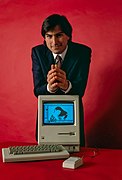Portal:Internet
The Internet PortalThe Internet (or internet) is the global system of interconnected computer networks that uses the Internet protocol suite (TCP/IP) to communicate between networks and devices. It is a network of networks that consists of private, public, academic, business, and government networks of local to global scope, linked by a broad array of electronic, wireless, and optical networking technologies. The Internet carries a vast range of information resources and services, such as the interlinked hypertext documents and applications of the World Wide Web (WWW), electronic mail, telephony, and file sharing. The origins of the Internet date back to research that enabled the time-sharing of computer resources and the development of packet switching in the 1960s which led to the design of computer networks for data communication. The set of rules (communication protocols) to enable internetworking on the Internet arose from research and development commissioned in the 1970s by the Defense Advanced Research Projects Agency (DARPA) of the United States Department of Defense in collaboration with universities and researchers across the United States and in the United Kingdom and France. The ARPANET initially served as a backbone for the interconnection of regional academic and military networks in the United States to enable resource sharing. The funding of the National Science Foundation Network as a new backbone in the 1980s, as well as private funding for other commercial extensions, encouraged worldwide participation in the development of new networking technologies and the merger of many networks using DARPA's Internet protocol suite. The linking of commercial networks and enterprises by the early 1990s, as well as the advent of the World Wide Web, marked the beginning of the transition to the modern Internet, and generated sustained exponential growth as generations of institutional, personal, and mobile computers were connected to the network. Although the Internet was widely used by academia in the 1980s, the subsequent commercialization in the 1990s and beyond incorporated its services and technologies into virtually every aspect of modern life. (Full article...) Selected articleTwitter, officially known since July 2023 as X, is a social networking service. It is one of the world's largest social media websites and one of the most visited websites in the world. Users can share short text messages, images, and videos in posts (formerly "tweets") and like or repost/retweet other users' content. X also includes direct messaging, video and audio calling, bookmarks, lists and communities, and Spaces, a social audio feature. Users can vote on context added by approved users using the Community Notes feature. Twitter was created in March 2006 by Jack Dorsey, Noah Glass, Biz Stone, and Evan Williams, and was launched in July of that year. Twitter grew quickly; by 2012 more than 100 million users produced 340 million tweets per day. Twitter, Inc., was based in San Francisco, California, and had more than 25 offices around the world. A signature characteristic of the service initially was that posts were required to be brief. Posts were initially limited to 140 characters, which was changed to 280 characters in 2017. The limitation was removed for subscribed accounts in 2023. The majority of tweets are produced by a minority of users. In 2020, it was estimated that approximately 48 million accounts (15% of all accounts) were not genuine people. (Full article...) Selected picture Wi-Fi (/ˈwaɪfaɪ/ wye-fye) is a wireless technology brand owned by the Wi-Fi Alliance intended to improve the interoperability of wireless local area network products based on the IEEE 802.11 standards. Common applications for Wi-Fi include Internet and VoIP phone access, gaming, and network connectivity for consumer electronics such as televisions, DVD players, and digital cameras. News
Wikinews Internet portal
WikiProjects
Did you know (auto-generated) -
Selected biography
Albert Arnold "Al" Gore, Jr. (born March 31, 1948) was the forty-fifth Vice President of the United States, serving from 1993 to 2001 under President Bill Clinton. Gore previously served in the U. S. House of Representatives (1977–85) and the U. S. Senate (1985–93), representing Tennessee. He was the Democratic Party presidential nominee in the 2000 election, and shared the 2007 Nobel Peace Prize with the Intergovernmental Panel on Climate Change for his work as an environmental activist. Gore has been involved with the development of the Internet since the 1970s, first as a Congressman and later as Senator and Vice-President. His High Performance Computing and Communication Act of 1991 (often referred to as the Gore Bill) was passed on December 9, 1991 and led to the National Information Infrastructure (NII) which Gore referred to as the "information superhighway." Leonard Kleinrock, a key player in the development of the ARPANET, considers the act to be a critical moment in Internet history. Internet pioneers Vint Cerf and Bob Kahn stated in the 2000 article "Al Gore and the Internet", that Gore was "the first political leader to recognize the importance of the Internet and to promote and support its development."
General images -The following are images from various internet-related articles on Wikipedia.
Selected quoteMore Did you know...
Main topics
Featured contentCategoriesRelated portalsThings you can do
Associated WikimediaThe following Wikimedia Foundation sister projects provide more on this subject:
Wikipedia's portals |






















































